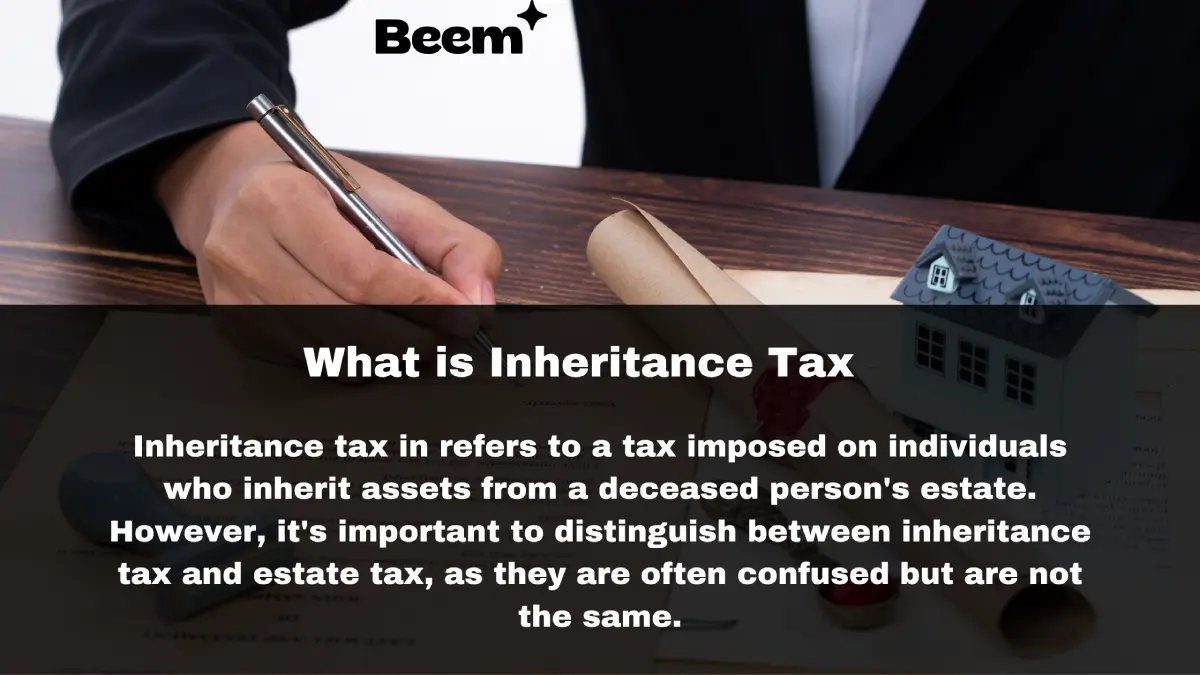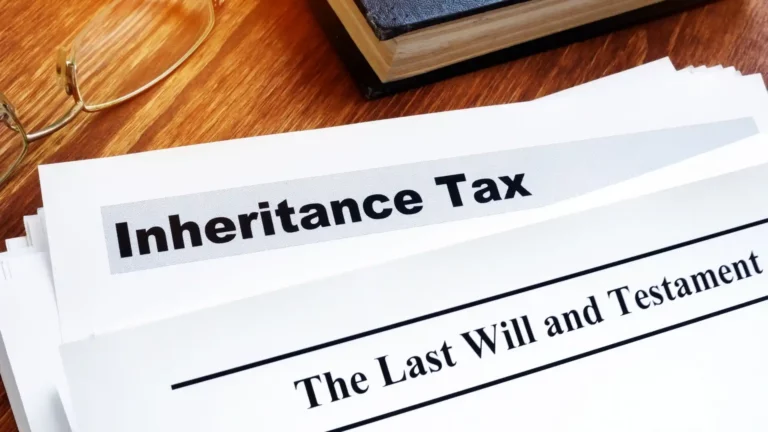Think of inheritance tax as a surprise bill that pops up when you inherit some goodies from a loved one. It’s not something you’ll find everywhere in the US.
If you’re in one of the lucky six states that have it, you’ll need to give a portion of your inheritance to the government.
But don’t worry! The amount you’ll pay depends on where your loved one lived, how much you’re inheriting, and how closely you were related to them.
What is Inheritance Tax?

Inheritance tax refers to a tax imposed on individuals who inherit assets from a deceased person. However, it’s important to note that the federal government in the U.S. does not impose an inheritance tax. What the federal government levies is an estate tax, which is different from an inheritance tax.
Inheritance Tax in the US (as of January 2024)
| State | Taxable Threshold | Rates | Exemptions |
|---|---|---|---|
| Iowa | $1 million | 4.5% – 15% | Spouses, minor children, certain charities |
| Kentucky | $1 million | 4% – 16% | Spouses, minor children, certain charities |
| Maryland | $15,000 (spouses/children); $1 million (others) | 4.5% – 10% | Spouses, minor children, certain charities |
| Nebraska | $16,000 (spouses/children); $1 million (others) | 4% – 18% | Spouses, minor children, certain charities |
| New Jersey | $675,000 (direct descendants); $2.5 million (others) | 6.25% – 11.5% | Spouses, civil partners, domestic partners, certain charities |
| Pennsylvania | $5 million | 4.5% – 12% | Spouses, minor children, certain charities |
| No Inheritance Tax | Alabama, Alaska, Arizona, Arkansas, California, Colorado, Connecticut, Delaware, Florida, Georgia, Hawaii, Idaho, Illinois, Indiana, Kansas, Louisiana, Maine, Massachusetts, Michigan, Minnesota, Mississippi, Missouri, Montana, Nevada, New Hampshire, New Mexico, New York, North Carolina, North Dakota, Ohio, Oklahoma, Oregon, Rhode Island, South Carolina, South Dakota, Tennessee, Texas, Utah, Vermont, Virginia, Washington, West Virginia, Wisconsin, Wyoming |
Inheritance Tax v/s Estate Tax
If you thought inheritance tax and estate tax were the same thing, think again! Estate taxes are like a buffet, where the government gets the first pick before the assets are passed out. On the other hand, inheritance taxes are like a surprise bill for the inheritor.
The key distinction between inheritance and estate taxes is who is held responsible for paying the tax. With estate taxes, the burden falls on the estate. The executor is responsible for filing a return and paying the tax using the estate’s funds.
The tax is calculated based on the total value of the deceased’s assets. They must be paid before any distribution to beneficiaries can occur. In contrast, an inheritance tax is imposed on the recipients of the assets, and the rate and amount of the tax depends on the value of the inheritance and the relationship of the beneficiary to the deceased.
The States and Exceptions
The federal government does not impose an inheritance tax in the U.S. However, six states: Iowa, Kentucky, Maryland, Nebraska, New Jersey, and Pennsylvania do impose an inheritance tax. The amount and rate of the tax will depend on the value of the inheritance, the relationship of the beneficiary to the deceased, and the state’s laws.
In most states, a spouse is not required to pay taxes on property inherited from their partner. Other dependents, such as children, may also be eligible for the same tax exemption, although it may only apply to certain portions of the inherited property. Individuals who inherit property from someone they are not related to will typically have to pay higher taxes.
How is it Calculated?
As already said, most states divide beneficiaries into different groups based on their relationship to the deceased person.
Most states also set a certain amount below which no taxes are imposed. This means that only the inheritance above a certain amount is subject to tax. The tax rate is usually a percentage of the sum above the threshold and can be flat or graduated, depending on the state. For example, Kentucky has a tax rate that ranges from 4% to 16%, rising as the inheritance amount increases, from $1,000 to over $200,000. It also imposes a flat dollar figure, ranging from $30 to $28,670, based on the sum inherited.
Also Read: What Happens If You Don’t Pay RITA Taxes?
Avoiding Inheritance Tax
Inheritance taxes can be a complex issue, but there are ways to mitigate it. Spouses and dependents often have exemptions and exceptions, but for those with substantial assets, additional planning may be necessary.
One strategy is to purchase a life insurance policy and name the intended heir as the beneficiary. The death benefit from a life insurance policy is typically not subject to inheritance taxes.
Another option is to place assets in a trust, such as an irrevocable trust. This can effectively remove them from your estate and limit their classification as an inheritance upon your death. Trusts also provide the ability to schedule the distribution of funds.
Bottom Line
Inheriting assets or cashing out certain accounts can be like winning the lottery… except for the tax bill that comes with it! But don’t worry, you can avoid any surprise bills by setting aside some funds.
Just remember, Uncle Sam may want a cut of any appreciated assets or retirement account distributions. And don’t forget, if you don’t pay on time, you might end up with a penalty or interest.
But don’t stress too much, just keep in mind that inheritance tax laws can vary from state to state, so make sure you’re ready for whatever comes your way.
File your taxes with Beem. Estimate your Federal and State taxes with Beem’s Free Tax Calculator. Enjoy hassle-free tax filing with our 100% accuracy and get the maximum refund. Get started now.




























